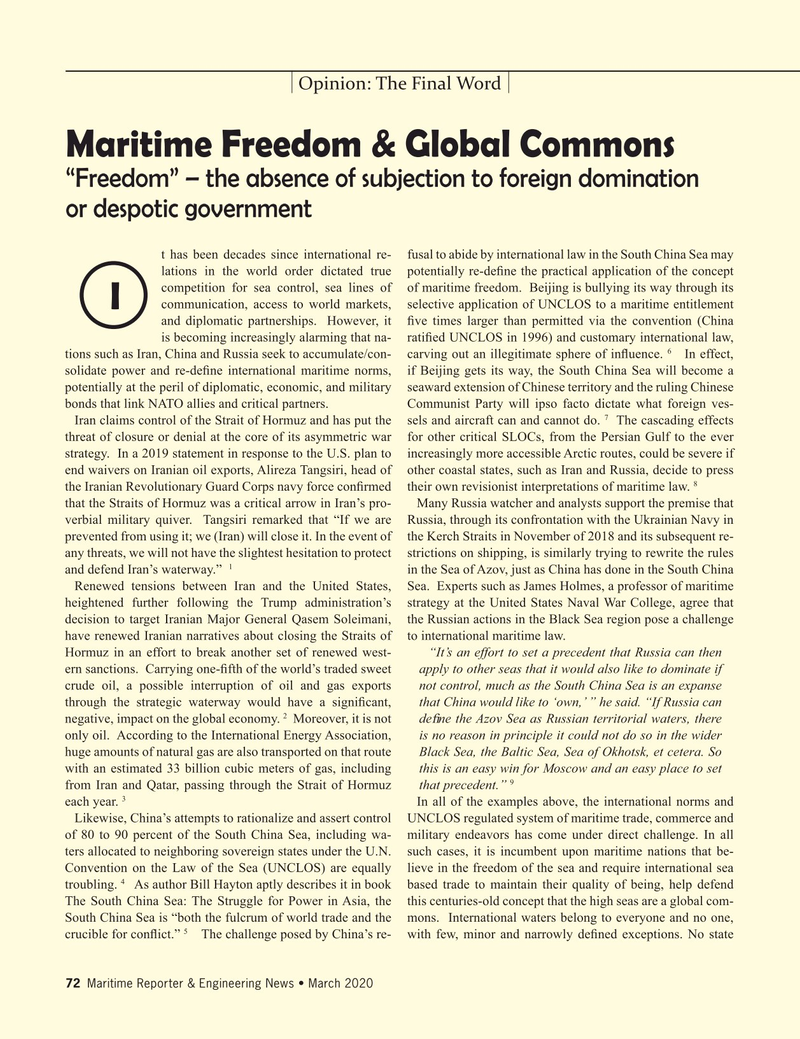
Page 72: of Maritime Reporter Magazine (March 2020)
Cruise Shipping Annual
Read this page in Pdf, Flash or Html5 edition of March 2020 Maritime Reporter Magazine
Opinion: The Final Word
Maritime Freedom & Global Commons “Freedom” – the absence of subjection to foreign domination or despotic government t has been decades since international re- fusal to abide by international law in the South China Sea may lations in the world order dictated true potentially re-de? ne the practical application of the concept competition for sea control, sea lines of of maritime freedom. Beijing is bullying its way through its communication, access to world markets, selective application of UNCLOS to a maritime entitlement
I and diplomatic partnerships. However, it ? ve times larger than permitted via the convention (China is becoming increasingly alarming that na- rati? ed UNCLOS in 1996) and customary international law, 6 tions such as Iran, China and Russia seek to accumulate/con- carving out an illegitimate sphere of in? uence. In effect, solidate power and re-de? ne international maritime norms, if Beijing gets its way, the South China Sea will become a potentially at the peril of diplomatic, economic, and military seaward extension of Chinese territory and the ruling Chinese bonds that link NATO allies and critical partners. Communist Party will ipso facto dictate what foreign ves- 7
Iran claims control of the Strait of Hormuz and has put the sels and aircraft can and cannot do. The cascading effects threat of closure or denial at the core of its asymmetric war for other critical SLOCs, from the Persian Gulf to the ever strategy. In a 2019 statement in response to the U.S. plan to increasingly more accessible Arctic routes, could be severe if end waivers on Iranian oil exports, Alireza Tangsiri, head of other coastal states, such as Iran and Russia, decide to press 8 the Iranian Revolutionary Guard Corps navy force con? rmed their own revisionist interpretations of maritime law. that the Straits of Hormuz was a critical arrow in Iran’s pro- Many Russia watcher and analysts support the premise that verbial military quiver. Tangsiri remarked that “If we are Russia, through its confrontation with the Ukrainian Navy in prevented from using it; we (Iran) will close it. In the event of the Kerch Straits in November of 2018 and its subsequent re- any threats, we will not have the slightest hesitation to protect strictions on shipping, is similarly trying to rewrite the rules 1 and defend Iran’s waterway.” in the Sea of Azov, just as China has done in the South China
Renewed tensions between Iran and the United States, Sea. Experts such as James Holmes, a professor of maritime heightened further following the Trump administration’s strategy at the United States Naval War College, agree that decision to target Iranian Major General Qasem Soleimani, the Russian actions in the Black Sea region pose a challenge have renewed Iranian narratives about closing the Straits of to international maritime law.
Hormuz in an effort to break another set of renewed west- “It’s an effort to set a precedent that Russia can then ern sanctions. Carrying one-? fth of the world’s traded sweet apply to other seas that it would also like to dominate if crude oil, a possible interruption of oil and gas exports not control, much as the South China Sea is an expanse through the strategic waterway would have a signi? cant, that China would like to ‘own,’ ” he said. “If Russia can 2 negative, impact on the global economy. Moreover, it is not de? ne the Azov Sea as Russian territorial waters, there only oil. According to the International Energy Association, is no reason in principle it could not do so in the wider huge amounts of natural gas are also transported on that route Black Sea, the Baltic Sea, Sea of Okhotsk, et cetera. So with an estimated 33 billion cubic meters of gas, including this is an easy win for Moscow and an easy place to set 9 from Iran and Qatar, passing through the Strait of Hormuz that precedent.” 3 each year. In all of the examples above, the international norms and
Likewise, China’s attempts to rationalize and assert control UNCLOS regulated system of maritime trade, commerce and of 80 to 90 percent of the South China Sea, including wa- military endeavors has come under direct challenge. In all ters allocated to neighboring sovereign states under the U.N. such cases, it is incumbent upon maritime nations that be-
Convention on the Law of the Sea (UNCLOS) are equally lieve in the freedom of the sea and require international sea 4 troubling. As author Bill Hayton aptly describes it in book based trade to maintain their quality of being, help defend
The South China Sea: The Struggle for Power in Asia, the this centuries-old concept that the high seas are a global com-
South China Sea is “both the fulcrum of world trade and the mons. International waters belong to everyone and no one, 5 crucible for con? ict.” The challenge posed by China’s re- with few, minor and narrowly de? ned exceptions. No state 72 Maritime Reporter & Engineering News • March 2020
MR #3 (66-74).indd 72 3/6/2020 9:50:13 AM

 71
71

 73
73
